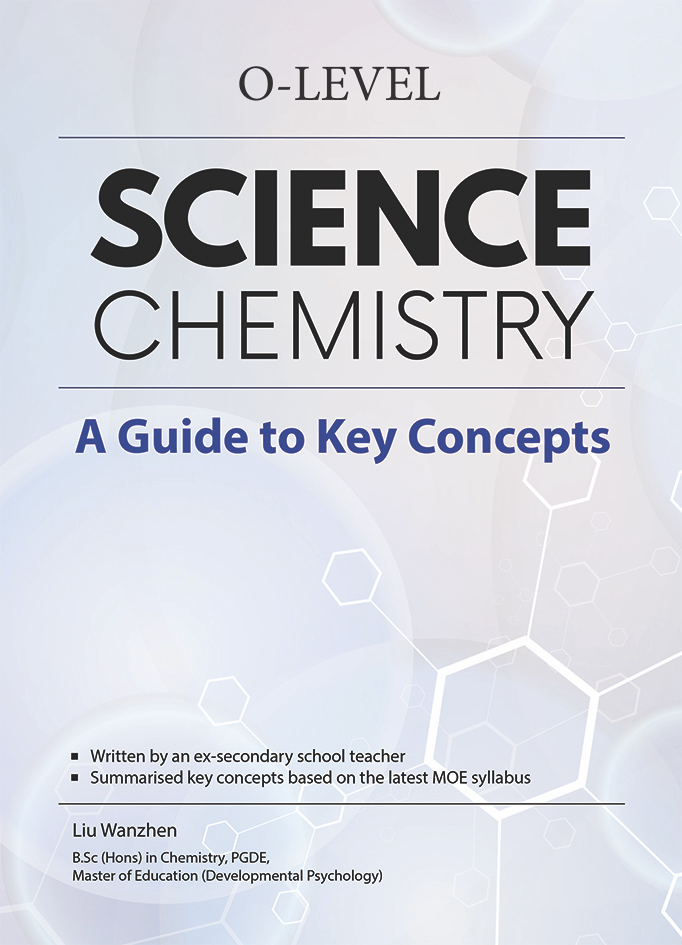Liu Wanzhen holds a Master of Education in Developmental Psychology from the National Institute of Education (NIE) and a Bachelor of Science (Honours) from Nanyang Technological University (NTU).
She has more than 10 years of teaching experience as a secondary school Chemistry teacher and as a tutor. In her current role, she is an educational coach and instructor who guides students to achieve content mastery and to develop skills such as determination and self-esteem to succeed in their studies. She has also conducted talks to advise parents on the ways that they can motivate and engage their children in learning.
Wanzhen is the author of “O-Level Science Chemistry: A Guide to Key Concepts”. This book is a guide to key concepts in Chemistry for the O-Level Combined Science subject and is based on the latest MOE syllabus.
Important Chemistry concepts are presented in simple and concise points for quick and easy reference, making it ideal for quick revision before a test or an examination. Relevant examples and diagrams are also provided to facilitate the understanding of important Chemistry concepts.
She shares with us some thoughts about the book, as well as her experiences and advice on how parents can play a part in their children’s education.
About your book

1. How will this book help students to better understand Chemistry concepts?
The concepts are categorised and summarised in a simple manner to help students to align their focus on what is important. It also highlights the important scientific keywords necessary for students to score in their exams.
2. What are the skills that you are hoping for students to acquire through this book?
I hope students can become:
- More independent and self-directed in their learning.
- Better problem solvers who are able to correctly identify the key concepts needed to explain the answer to a question.
- Better organisers who can break down big concepts that they have learnt into smaller and more manageable concepts for better recall.
3. Are there any Chemistry concepts that you think are common in everyday life but people do not notice?
Yes! There many examples, like salt forming on your body after a swim in the sea due to the evaporation of seawater. Or gas bubbles being formed when vitamin C tablets are placed in water because acid displays its acidic properties when dissolved in water.
4. Can you share some advice on how to use this book effectively?
Please read carefully and understand all the concepts. Remember the concepts by how they are categorised. For example, there are 3 key concepts in this topic. The first key concept is … the second key concept is … and so on.
Remember the details in the key concepts and focus on the scientific keywords marked out in bold. During the exam, after reading the question, you have to:
– Identify the topic.
– Recall the key concepts in that topic.
– Apply the key concepts that are most related to the question.
5. In your opinion, what is the most effective method to study Chemistry?
You have to understand the topics and theories in the syllabus and remember their key concepts when studying. You also have to be able to recall all the scientific keywords in each concept if possible. Practising questions from past year O-Level examination papers can help you greatly with retaining what you have studied.
6. What are some of the common mistakes that Chemistry students make?
Common mistakes include: writing answers in your own words (using layman terms) instead of using the scientific keywords to explain the concepts, not using the correct concepts to explain the answer and not providing detailed explanations to answers.
7. What is the number one thing that all Chemistry students should remember?
“Which key concepts are you using to explain this question?”
If students cannot identify the key concept required, there is a high chance that they have answered the question in their own way/words and they will not achieve the marks.
8. Lastly, do you have any other insights to share with Chemistry students?
Find the best study method for yourself. Everyone is different. If you feel that you have been studying but are not achieving the results you want, it is best to reflect on your method and change it.
About Yourself/Work/Expertise

1. Can you share some tips on how students can stay motivated in their studies?
It is important to set realistic goals. Reward yourself after you have completed a task or achieved your goals.
2. What are some of the usual concerns you’ve received from parents about their children’s studies?
Some of the concerns include how they can tackle their children’s lack of motivation to study, improve their children’s study skills and address distractions when their children should be studying.
3. What advice do you have for the parents over these concerns?
Be involved in their learning by assessing if there is anything that you could do to help your child.
For example, if the student is distracted at home, you can bring them to a café or library to study while you do your work at the same time.
Be involved in their learning, instead of being controlling.
4. Why is Chemistry an important subject in relation to everyday life?
It is because everything we do involves Chemistry in one way or another, for example, I shared earlier about sea salt forming on our bodies when we go swimming.
5. Can you share a little about content mastery and why it is important?
Content mastery is closely related to self-efficacy and hence the self-confidence of a student. When a student gains content mastery, they have a higher chance to be a more confident and independent learner.
6. Can you share some advice on how students can gain content mastery?
There are many ways to gain content mastery and it is not a one-time process. It is usually from an ongoing programme that employs many different strategies to help students to master their learning.
For example, an educator could start by giving more manageable tasks for students to gain a sense of competency first. Then, when the student is ready, the educator can guide the student to do some self-directed learning, before giving them assessments and so on.
7. What are some simple steps that students can take to achieve success in life?
Students should learn to explore and find a motivating factor or goal in life. They should always reflect on their work and their study methods to assess the effectiveness and their productivity.
They should also learn to seek help when necessary.
8. Lastly, do you have any other insights to share with students and parents?
Parents should learn to give positive feedback and encouragement even when the student is not scoring within their expectations. Parents should focus on the effort and improvement that their children put into their studies, and not only on the results.
Taking examinations is like running a marathon; it is a long process which involves a lot of effort, mistakes, reflection, method adjustment, time management and study skills development.
Also, never forget to take breaks in between and recharge yourself. With perseverance and discipline, everyone can succeed!
